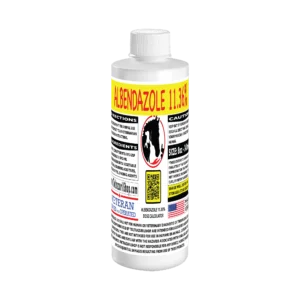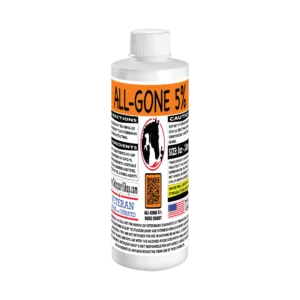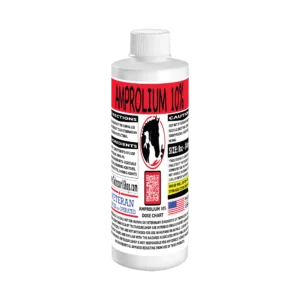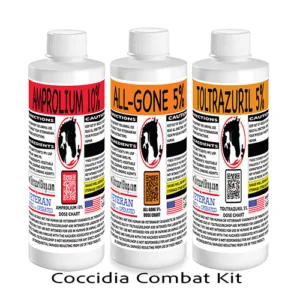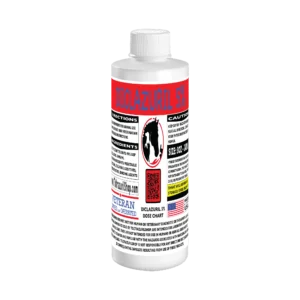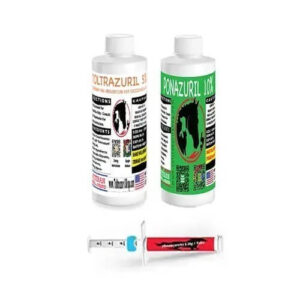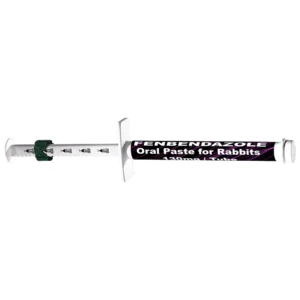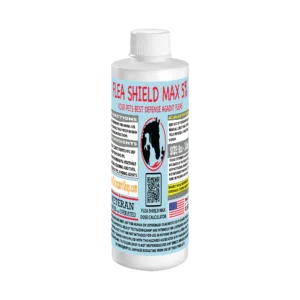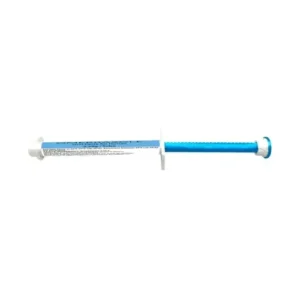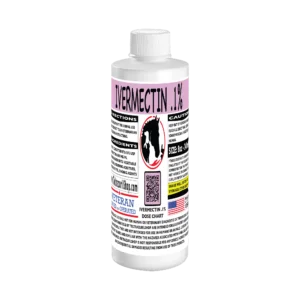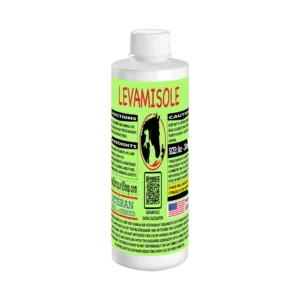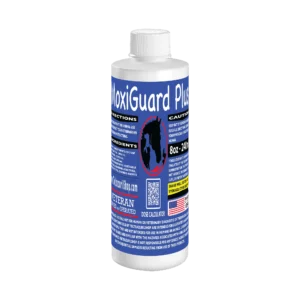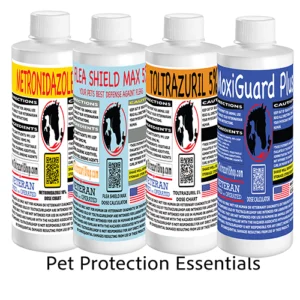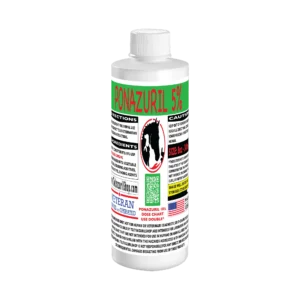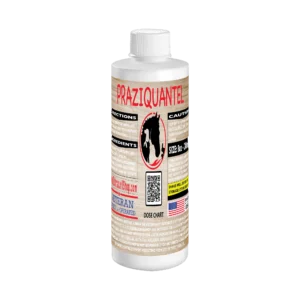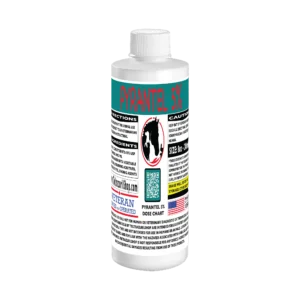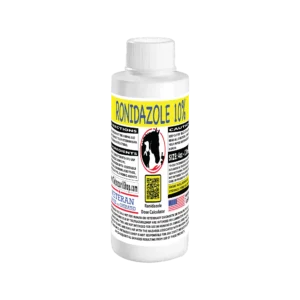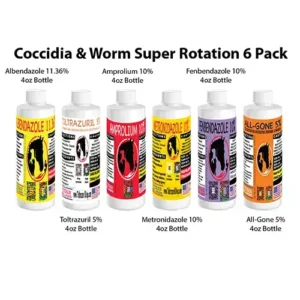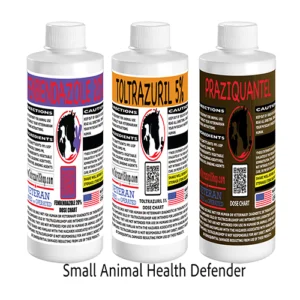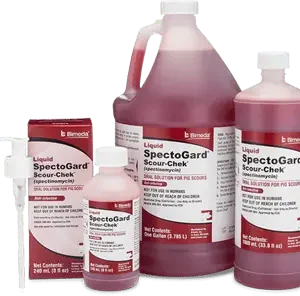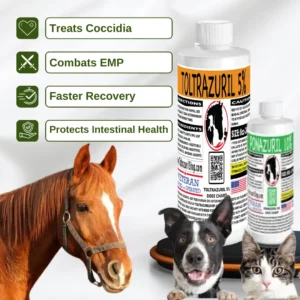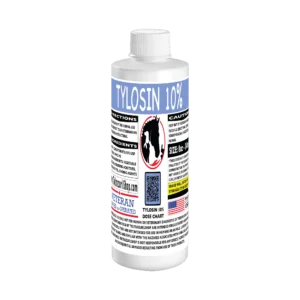-
Animal Products
Albendazole 11.36% Liquid Solution
$9.95 – $219.95 Select options This product has multiple variants. The options may be chosen on the product pageRated 0 out of 5 -
Animal Products
All-Gone 5% Oral Suspension for Pets
$19.95 – $349.95 Select options This product has multiple variants. The options may be chosen on the product pageRated 0 out of 5 -
Animal Products
Amprolium 10% Liquid Solution
$5.95 – $54.95 Select options This product has multiple variants. The options may be chosen on the product pageRated 0 out of 5 -
De-Wormers
Blackout EPM & Coccidia Solution: Fast-Acting Treatment for Coccidiosis and EPM Symptoms
Rated 0 out of 5$119.99Original price was: $119.99.$69.95Current price is: $69.95. Add to cart -
Animal Products
Coccidia Combat Kit
Rated 0 out of 5$99.99Original price was: $99.99.$59.95Current price is: $59.95. Add to cart -
Animal Products
Diclazuril 5% Liquid Solution
$19.95 – $29.95 Select options This product has multiple variants. The options may be chosen on the product pageRated 0 out of 5 -
Animal Products
EPM & Ulcer Eliminator Bundle for Horses
Rated 0 out of 5$269.95Original price was: $269.95.$199.95Current price is: $199.95. Add to cart -
Animal Products
Fen Ben Pro Liquid Dewormer
$14.95 – $409.95 Select options This product has multiple variants. The options may be chosen on the product pageRated 0 out of 5 -
Animal Products
Fenbendazole Liquid Dewormer
$14.95 – $409.95 Select options This product has multiple variants. The options may be chosen on the product pageRated 0 out of 5 -
Animal Products
Fenbendazole Paste | Best Vet-Approved Parasite Protection | 130mg / Tube
Rated 0 out of 5$9.95Original price was: $9.95.$6.95Current price is: $6.95. Add to cart -
Animal Products
Flea Shield Max Flea & Tick Solution
$19.95 – $199.95 Select options This product has multiple variants. The options may be chosen on the product pageRated 0 out of 5 -
Animal Products
Horse Ulcer Treatment | 2.28g Paste Tube
$0.00 – $599.95 Select options This product has multiple variants. The options may be chosen on the product pageRated 0 out of 5 -
Animal Products
Ivermectin Liquid Solution
$6.95 – $129.95 Select options This product has multiple variants. The options may be chosen on the product pageRated 0 out of 5 -
Animal Products
Levamisole 10% Liquid Solution
$12.95 – $249.95 Select options This product has multiple variants. The options may be chosen on the product pageRated 0 out of 5 -
Animal Products
Max EPM Bundle for Horses – Toltrazuril Shop
Rated 0 out of 5$169.99Original price was: $169.99.$99.95Current price is: $99.95. Add to cart -
Animal Products
Metronidazole 10% Liquid Solution
$24.95 – $399.95 Select options This product has multiple variants. The options may be chosen on the product pageRated 0 out of 5 -
Animal Products
MoxiGuard Plus – Moxydectin / Pyrantel / Sarolaner Solution
$39.95 – $199.95 Select options This product has multiple variants. The options may be chosen on the product pageRated 0 out of 5 -
Animal Products
Nitenpyram Flea Shield Max Flea & Tick Solution
$19.95 – $199.95 Select options This product has multiple variants. The options may be chosen on the product pageRated 0 out of 5 -
Animal Products
Omeprazole Paste for Horse Ulcer Treatment | 2.28g Paste Tube
$0.00 – $599.95 Select options This product has multiple variants. The options may be chosen on the product pageRated 0 out of 5 -
Animal Products
Pet Protection Essentials
Rated 0 out of 5$319.99Original price was: $319.99.$189.95Current price is: $189.95. Add to cart -
Animal Products
Ponazuril Liquid Solution
$19.95 – $499.95 Select options This product has multiple variants. The options may be chosen on the product pageRated 0 out of 5 -
Cat Dewormer
Praziquantel Liquid Solution
$22.95 – $39.95 Select options This product has multiple variants. The options may be chosen on the product pageRated 0 out of 5 -
De-Wormers
Pyrantel 5% Liquid Solution
$12.95 – $159.95 Select options This product has multiple variants. The options may be chosen on the product pageRated 0 out of 5 -
Animal Products
Ronidazole 10% Liquid Solution
Rated 0 out of 5$63.99Original price was: $63.99.$29.95Current price is: $29.95. Select options This product has multiple variants. The options may be chosen on the product page -
Animal Products
Small Animal Coccidia & Wormer Bundle
Rated 0 out of 5$199.95Original price was: $199.95.$79.95Current price is: $79.95. Add to cart -
Animal Products
Small Animal Coccidia & Wormer Bundle 6 Pack Rotation
Rated 0 out of 5$149.99Original price was: $149.99.$89.95Current price is: $89.95. Add to cart -
Animal Products
Small Animal Coccidia & Wormer Bundle 8oz Bottles
Rated 0 out of 5$234.99Original price was: $234.99.$139.95Current price is: $139.95. Add to cart -
Animal Products
Small Animal Health Defender
Rated 0 out of 5$189.99Original price was: $189.99.$109.95Current price is: $109.95. Add to cart -
Cattle
Spectinomycin 5% Liquid Solution – Effective Antibiotic for Livestock and Poultry Health
$19.95 – $59.99 Select options This product has multiple variants. The options may be chosen on the product pageRated 0 out of 5 -
Animal Products
Toltrazuril Liquid Solution
$4.95 – $999.95 Select options This product has multiple variants. The options may be chosen on the product pageRated 0 out of 5 -
Animal Products
Tylosin 10% Liquid Solution
$15.96 – $99.95 Select options This product has multiple variants. The options may be chosen on the product pageRated 0 out of 5 -
Animal Products
Ultimate Wormer Rotation Pack – 4oz Bottle of Each
Rated 0 out of 5$149.95Original price was: $149.95.$79.95Current price is: $79.95. Add to cart
Coccidiosis Prevention – Your Trusted Source for Animal Health Solutions
At Coccidiosis Prevention, we are dedicated to providing high-quality, effective, and affordable treatments for coccidiosis and other parasitic infections in animals. Whether you are a pet owner, farmer, or veterinarian, our comprehensive selection of animal health products ensures the best care for your livestock and pets. With a focus on prevention and treatment, we bring you a range of liquid solutions, dewormers, and parasite protection essentials to maintain the health and well-being of your animals.
Why Choose Coccidiosis Prevention?
- Premium Quality Products – We source only the best treatments for coccidiosis, deworming, and parasite control.
- Affordable Pricing – Competitive prices without compromising on quality.
- Expert-Approved Solutions – Trusted by veterinarians, farmers, and animal caregivers.
- Wide Range of Products – From liquid solutions to paste treatments, we have the right solution for every need.
- Fast & Secure Shipping – Get your orders delivered quickly and safely to your doorstep.
Our Best-Selling Products
Coccidiosis Treatments & Prevention
- Coccidia Combat Kit – A complete solution for treating coccidiosis and ensuring fast recovery.
- Blackout EPM & Coccidia Solution – Fast-acting treatment for coccidiosis and EPM symptoms.
- Toltrazuril Liquid Solution – A trusted option for coccidiosis prevention and treatment.
- Ponazuril Liquid Solution – Highly effective for eliminating coccidia infections in animals.
- Small Animal Coccidia & Wormer Bundle – A perfect choice for small pets needing comprehensive parasite protection.
Dewormers & Parasite Control
- Fenbendazole Liquid Dewormer – A reliable dewormer for livestock and pets.
- Pyrantel 5% Liquid Solution – Ideal for deworming horses, dogs, and other animals.
- Levamisole 10% Liquid Solution – Helps in controlling and treating worm infestations.
- Praziquantel Liquid Solution – Effective against tapeworms and other internal parasites.
- Fen Ben Pro Liquid Dewormer – Provides broad-spectrum parasite control.
Flea & Tick Protection
- Flea Shield Max Flea & Tick Solution – Ensures long-lasting protection against fleas and ticks.
- Nitempyram Flea Shield Max – A fast-acting solution to eliminate flea infestations.
- MoxiGuard Plus – Moxidectin / Pyrantel / Sarolaner Solution – A powerful combination for parasite control.
Horse & Livestock Health Solutions
- Horse Ulcer Treatment – 2.28g Paste Tube – A specialized treatment for equine ulcers.
- Omeprazole Paste for Horse Ulcer Treatment – Ensures better digestive health for horses.
- Spectinomycin 5% Liquid Solution – Effective antibiotic for livestock and poultry health.
- Max EPM Bundle for Horses – A comprehensive treatment for EPM in horses.
Coccidiosis Prevention & Treatment – Why It Matters
Coccidiosis is a common parasitic disease that affects many animals, including poultry, cattle, horses, and pets. Left untreated, it can cause severe health issues and even lead to fatalities. At Coccidiosis Prevention, we believe in proactive care, offering products that not only treat but also prevent infections.
Our Coccidia Combat Kit and Blackout EPM & Coccidia Solution are designed to provide fast-acting relief, ensuring your animals stay healthy and protected from harmful parasites. Additionally, our Toltrazuril Liquid Solution is a trusted choice for eliminating coccidia infections before they escalate.
Shop with Confidence
We are committed to delivering only the best products that meet high industry standards. Whether you need Albendazole 11.36% Liquid Solution for livestock or Metronidazole 10% Liquid Solution for comprehensive infection control, we have everything you need to keep your animals safe and healthy.
With Coccidiosis Prevention, you can trust that you are providing your animals with the best care possible. Browse our collection today and give your pets and livestock the protection they deserve.
Have Questions? Contact Us!
Our team is here to help! If you have any questions about our products or need assistance choosing the right solution, feel free to reach out to us. Your animals’ health is our priority!
Stay Ahead of Parasites – Shop Now!
